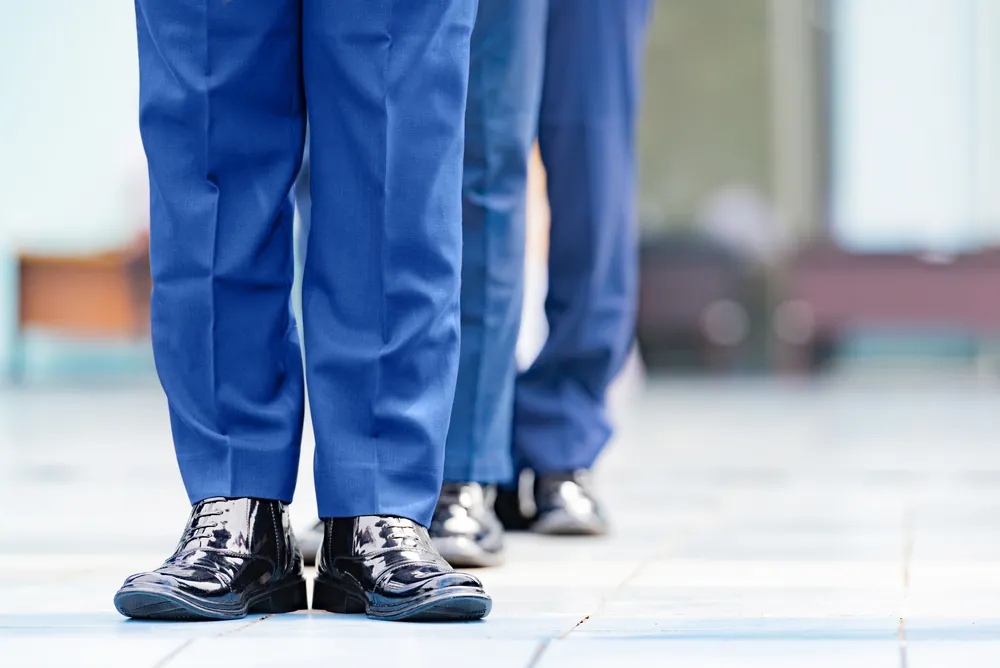A healthy employee should not experience any problems from having to stand up during work. However, in order to enjoy the best comfort, you should consider several factors.
One of the most important elements is undoubtedly the choice of your footwear.
Shoes can have a direct influence on the vulnerability of your feet as well as on your overall posture.
Here is a list of the most suitable types of shoes to wear when working in a standing position.
Footwear adapted to the dimensions of your feet
Besides their professional look, the most important thing to consider when choosing your footwear is the size of your work shoes.
Whether you are a blue-collar employee or you work in a corporate setting, the size of your shoes is absolutely crucial for your comfort.
If you have a job that requires you to wear steel-toed boots, for example, and the boots are too tight, you may end up scratching your toes.
The same goes for those who wear high heels on a regular basis.
Choosing the right shoe size will help you avoid unfortunate foot ailments, such as:
- The stress fracture;
- The deformity of hammertoes;
- The bunion of the foot, especially if you have to work in high heels;
- The acquired flat foot;
- Blisters on the feet;
- Osteoarthritis of the big toe (hallux rigidus).
If you’d like to test the size of a shoe, you can simply remove the mock sole.
This way you can better compare the size of your foot with that of the shoe.
Shoes that provide good support to the heel
Your heels are responsible for regulating your balance when standing up. Therefore, your shoes should adapt to this function.
However, if your footwear does not sufficiently support your heels, the weight that burdens them can lead to the development of plantar problems.
Here are some injuries and pathologies specific to the heel that can be aggravated by a poor choice of footwear:
- Calcaneal bursitis;
- Fracture of the calcaneus;
- Plantar fasciitis;
- Heel spur;
- Panniculitis in the heel.
To improve your boots or shoes for your professional activity, you can also add prefabricated gel heel inserts.
These help to mitigate the effects of weight transfer during movement.
On hard surfaces, we recommend you to wear a shoe with a wide outsole.
Shoes that let your feet breathe
It is important to wear shoes that can efficiently wick away moisture, especially if you have a physically demanding job.
Shoes and socks that are constantly wet, create environments that facilitate the growth of bacteria.
Eventually, they can cause skin problems and toenail diseases, such as:
- The ingrown nail;
- Plantar warts;
- Athlete’s foot;
- Nail fungus (Onychomycosis).
On top of these problems, sweat can cause foul odors and can wear out the inside of your shoes faster.
Shoes that are adaptable
The soles of your shoes need to be responsive, particularly if your daily tasks require regular movement.
If you are walking on a hard concrete or cement floor, this feature is even more important.
Among other things, the use of shoes with flexible soles allows you to:
- Reduce muscle fatigue;
- Prevent cramps;
- Stabilize the foot and leg;
- Maintain adequate posture;
- Help you move more smoothly.
The podiatrist comes to your rescue when good footwear is no longer enough
Even if you choose and buy your work shoes carefully, you may still experience pain.
In such a case, the podiatrist can step in to help.
Various diagnostic tests will allow your doctor to determine what is causing the discomfort and suggest additional methods of treatment.
These can be, for example, custom-made foot orthoses, orthopedic shoes, or even manual foot therapy.
If plantar pain is preventing you from working comfortably, contact your PiedReseau podiatrist right away.

